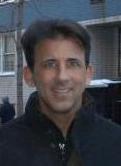 By 1992, the ground had shifted and a rapprochement of sorts existed. GLID honored him at that year's annual dinner; that's me presenting his award "for his commitment to health care issues and for promoting lesbian and gay political power in the Upper West Side." And six years later he returned the favor: he served as presenter when I received the 1998 Howard Schaetzle Award, named in memory of a mutual friend who was an unsung grassroots activist.
By 1992, the ground had shifted and a rapprochement of sorts existed. GLID honored him at that year's annual dinner; that's me presenting his award "for his commitment to health care issues and for promoting lesbian and gay political power in the Upper West Side." And six years later he returned the favor: he served as presenter when I received the 1998 Howard Schaetzle Award, named in memory of a mutual friend who was an unsung grassroots activist.As "the first openly gay black member of the City Council," as well openly HIV-positive, Phil chalked up a lot of footnote firsts. But, like any friend, he was more to us than these categories, which he reluctantly resigned himself to for political purposes but resented all the same--"I'm openly male, too," he once said to me under his breath when he endured such descriptions at yet another event. And he was one of the funniest politicians I'd ever met; his caustic, catty, campy wit pretty much insured he would never be elected to a higher post. (Without directly naming him, I mentioned him in an anecdote I recalled last year about the difficulties black men faced simply hailing a cab in Manhattan.)
Since I "retired" from politics a few years ago, I hadn't seen him much, something I'll forever regret. He is and will be missed.
